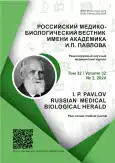Modern Trends in Development of Educational and Scientific Discipline ‘Public Health and Healthcare’: Its Methodological Role and Integrative Function
- Authors: Kagramanyan I.N.1, Reshetnikov V.A.1, Manerova O.A.1, Yakushina I.I.1, Shustikova E.A.1, Ismail-zade N.T.1
-
Affiliations:
- I. M. Sechenov First Moscow State Medical University (Sechenovskiy University)
- Issue: Vol 32, No 2 (2024)
- Pages: 329-338
- Section: Discussion
- URL: https://journal-vniispk.ru/pavlovj/article/view/260182
- DOI: https://doi.org/10.17816/PAVLOVJ630115
- ID: 260182
Cite item
Abstract
INTRODUCTION: In modern conditions of social development, there is a change of emphasis in definitions concerning not only public, but also individual health. Preserving and strengthening the health of the population is a complex task that implies the interaction of various specialists. This integration, the complexity of interaction in issues concerning preserving and strengthening the health of the population, should undoubtedly be reflected in the training of specialists, and, first of all, in higher medical education.
AIM: To determine the role of the discipline ‘Public Health and Healthcare’ (PHH) in teaching population health issues and in the integration of departments of various profiles in the study of individual, group and population health in modern conditions.
The article presents a discussion about modern trends in the development of the educational and scientific PHH discipline based on the opinions of students, teachers and the experience of Sechenovskiy University. Thus, students of profiles ‘General Medicine’, ‘Pediatrics’, ‘Medical and Preventive Care’ think that studying public health issues is the task of doctors of all clinical specialties (69.4%–76.7%), of hygienists (< 60.0%), of epidemiologists (< 30.0%). Integration in the teaching of PHH issues, according to teachers of PHH departments, in such types of activities as academic work, educational work, general scientific projects, joint printed works, textbooks and teaching aids, joint innovative projects, is mainly carried out with teachers of preventive educational disciplines, to a much lesser extent with teachers of clinical and fundamental disciplines.
CONCLUSION: An integrative approach to definitions, terms, and concepts is needed in the study of the health of individuals, population groups and population with a significant variety of disciplines and departments teaching them. The methodological role in teaching these issues is the prerogative of the PHH discipline.
Full Text
##article.viewOnOriginalSite##About the authors
Igor’ N. Kagramanyan
I. M. Sechenov First Moscow State Medical University (Sechenovskiy University)
Email: kagramanyan_i_n@staff.sechenov.ru
ORCID iD: 0000-0002-2139-6847
MD, Dr. Sci. (Med.), Professor
Russian Federation, MoscowVladimir A. Reshetnikov
I. M. Sechenov First Moscow State Medical University (Sechenovskiy University)
Email: reshetnikov_v_a@staff.sechenov.ru
ORCID iD: 0000-0002-7853-7356
SPIN-code: 4016-2059
MD, Dr. Sci. (Med.)
Russian Federation, MoscowOl'ga A. Manerova
I. M. Sechenov First Moscow State Medical University (Sechenovskiy University)
Author for correspondence.
Email: omanerova@mail.ru
ORCID iD: 0000-0002-1660-9414
SPIN-code: 6991-3622
MD, Dr. Sci. (Med.), Professor
Russian Federation, MoscowIrina I. Yakushina
I. M. Sechenov First Moscow State Medical University (Sechenovskiy University)
Email: yakushina_i_i@staff.sechenov.ru
ORCID iD: 0000-0002-6818-0840
SPIN-code: 5666-3696
MD, Cand. Sci. (Med.), Associate Professor
Russian Federation, MoscowElena A. Shustikova
I. M. Sechenov First Moscow State Medical University (Sechenovskiy University)
Email: shustikova_e_a@staff.sechenov.ru
ORCID iD: 0009-0009-9850-1869
Russian Federation, Moscow
Nazim T. ogly Ismail-zade
I. M. Sechenov First Moscow State Medical University (Sechenovskiy University)
Email: ismayilzada.n.t@gmail.com
ORCID iD: 0000-0002-5937-0255
SPIN-code: 7066-7085
MD, Cand. Sci. (Med.)
Russian Federation, MoscowReferences
- Studneva MA, Shved PG, Zhegalova IV, et al. First steps in implementation and future prospects of a project for training a new generation of specialists in pharmaceutical design and the biopharmaceutical industry. Vestnik of Saint Petersburg State University. Medicine. 2017;12(2):190–201. (In Russ). doi: 10.21638/11701/spbu11.2017.208
- Reshetnikov VA, Manerova OA, Sozinov AS, et al. Formation and development of public health teaching in the system of higher medical education (from social hygiene to public health and health care). Kazan Medical Journal. 2020;101(6):897–907. (In Russ). doi: 10.17816/KMJ2020-897
- Bogush NV. Personalizirovannaya meditsina v Rossii: sovremennoye sostoyaniye i osnovn•yye napravleniya razvitiya [Abstract]. In: Innovatsii v zdorov'ye natsii: sbornik materialov VI Vserossiyskoy nauchno-prakticheskoy konferentsii s mezhdunarodnym uchastiyem; Saint-Petersburg, 14–15 November 2018. Saint-Petersburg; 2018. P. 41–5. (In Russ).
- Gushchina AO. Vnedreniye 4R-meditsiny kak sledstviye razvitiya patsiyentooriyentirovannogo podkhoda k okazaniyu meditsinskoy pomoshchi [Abstract]. In: Upravleniye personalom, sotsial'nymi i biznes-kommunikatsiyami: metody, modeli, tekhnologii — 2021: materialy Vserossiyskoy nauchno-prakticheskoy konferentsii; Moscow, 31 March 2021. Moscow; 2021. P. 67–71. (In Russ).
- Prosyannikov MYu, Konstantinova OV, Voitko DA, et al. «Medicine 4P» on the example of managing patients with urolithiasis. Experimental and Clinical Urology. 2019;(4):19–24. (In Russ). doi: 10.29188/2222-8543-2019-11-4-19-24
- Kerschner JE. Transforming Medical Education. WMJ. 2017; 116(2):93–6.
- Lamb EI, Alberti H. Focus on medical education research in primary care: an undergraduate medical education faculty's journey. Educ Prim Care. 2021;32(2):70–2. doi: 10.1080/14739879.2020. 1837019
- Vybornov YuD. Personalized disease prevention. In: Materialy XIX mezhdunarodnogo kongressa “Zdorov'ye i obrazovaniye v XXI vekE”; Moscow, 18–20 December 2017. Moscow; 2017;19(12):90–4. (In Russ).
- Zhuravleva MV, Mudunov AM, Ulumbekova GE. Vector for personalized medicine: from practice implementation to expected results. Healthcare Management: News, Views, Education. Bulletin of VSHOUZ. 2021;7(4):51–63. (In Russ). doi: 10.33029/2411-8621-2021-7-4-51-63
- Pavlov ChS, Kovalevskaya VI, Kireeva NV, et al. Educational priorities and programs for the development of research competencies in science-based medical education. Cardiovascular Therapy and Prevention. 2022;21(4S):3481. (In Russ). doi: 10.15829/1728-8800-2022-3481
Supplementary files











